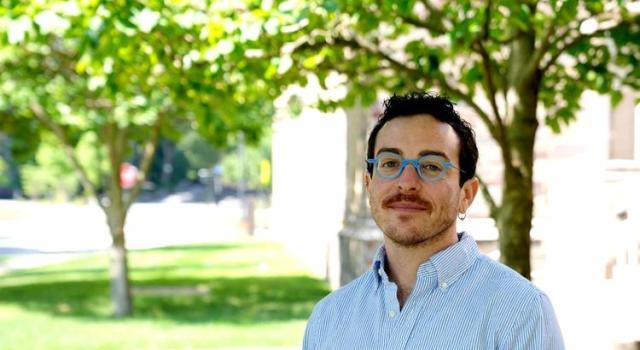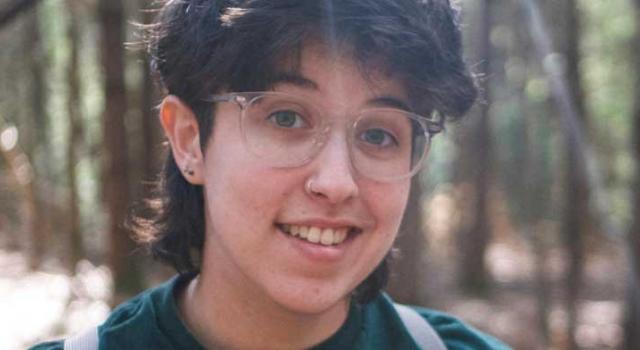Queer Studies
While heavily incorporated into women's studies, gender, being neither stable nor absolute, also lends itself to the study of queer identity. Issues such as straight masculinity, queer femininities, and gay male identity are becoming increasingly important to the study of gender, as is the transgender movement.
Queer studies at Hampshire utilizes gender theory/philosophy, historical analysis, critical race theory, and contemporary critique to further the discourse on queer identity and community, as well as notions of queering heterosexualized relationships and identities. Courses and projects within queer studies focus on the law, family structure, media representations, public health, religion, the arts, cultural studies, sexuality, and biology.
Student Project Titles
- "with love": queer mobility across the pomo world
- Gay or Gei? Japanese Yaoi Manga in the American Cultural Context
- The Marked Body: Queer Representation in Contemporary Art and the NEA
- An Exploration of Caribbean LGBT Experiences Through Dramaturgy and Performance
- NoPorn Northampton: An Interdisciplinary Ethnography Following One City's Struggle with Pornography
- Transgender and Transgression
- Transgender Legal Theory
Sample First-Year Course
Queering the Renaissance
We've always known that Michelangelo was gay and that Henri III, king of France, liked to cross-dress. Recent historical scholarship has shown how homosocial environments such as female convents, male literary academies, or youth associations promoted same-sex relationships. Especially after the re-discovery of the clitoris in the sixteenth-century, debates about hermaphrodites, the seat of lesbian desire, and the usefulness of African clitoridectomy stirred up the medical and political establishment. In the military, cross-dressing was rampant; even evidence of trans-gendering can be found in sixteenth-century Spain. This course will explore issues of self-identity in a period that, to contemporary observers, can seem hauntingly familiar and irrevocably foreign at the same time.
Sample Courses at Hampshire
- Bodies and Souls in History
- Commodities of Desire: Gendered Signs, Racialized Representations, and Pop Culture
- Creating Families
- Equal Protection of the Laws: Gender, Sex, and Race Discrimination in America
- Family, Gender, Power
- Feminist Fictions
- Gendered Identities in Music and Narrative Gifts, Sex and Commodities
- Identity Beyond Identity Politics
- Legal Construction of Sex, Marriage, and the Family
- Living for Tomorrow I: Cultural Contestations, Gender Politics, and the AIDS Epidemic
- Love, Sex, and Death
- Queer Cultures
- Queer Fictions of Race
- Queering the Renaissance
- Queer Publics
- Race, Sexuality, and the Transnational
Through the Consortium
- Gender, Sexuality, Literature, and Culture (UMass)
- Intro to Queer Theory (MHC)
- LGBT History in the U.S. (SC)
- The Politics of Sexuality in Muslim Contexts: From Colonial Discourses to Queer Activism (MHC)
- Queering American Literature (UMass)
- Queer Looks: Gender, Sexuality, and Film (SC)
- Representing Queerness (SC)
- Sexuality and Women's Writing (MHC)
Facilities and Resources
Collective Power for Reproductive Justice
Collective Power for Reproductive Justice (formerly the Civil Liberties and Public Policy Program), located at Hampshire, is a reproductive rights organization that trains, educates, and inspires new leaders, organizers, and supporters nationwide. Collective Power for Reproductive Justice works with new generations of activists to advance their leadership and strengthen the reproductive rights movement. Since its beginnings in 1981, Collective Power for Reproductive Justice has been training students and young people as reproductive rights activists. Collective Power for Reproductive Justice is also expanding the reach and impact of the movement by connecting reproductive rights to women's health, safety and empowerment, economic and racial justice, youth liberation, queer rights, environmental justice, peace and security, disability rights, and immigrants' rights.
Queer Community Alliance
The Queer Community Alliance is a student group composed of individuals who support sexual diversity. The QCA seeks to foster awareness of lesbian, gay, bisexual, trans, pan, and queer issues and create a comfortable space for their discussion through social events and political activism both at Hampshire and in the community at large. The QCA is a safe place of confidentiality and respect. People of all sexual preferences are welcome and encouraged to attend meetings as long as the safe space is respected. The QCA also advocates resisting all systems of oppression for freedom for all.
QUEST is a student group for queer, lesbian, gay, bisexual, transgender, and questioning students of color, international, and mixed heritage people.
The Stonewall Center
When it opened on the University of Massachusetts Amherst campus in 1985, the Stonewall Center (a Lesbian, Bisexual, Gay, and Transgender Educational Resource Center) was one of only three centers of its kind on college campuses across the country. Now, it has served as a model for many colleges and universities, leading to some 60 centers now in existence. For more than 20 years, the Stonewall Center has grown in size and scope, serving the campus and surrounding community by providing cultural and educational programming; video, audio, and text library holdings; educational resources, information and referral; harassment and discrimination response; advocacy; training and support; and community outreach through QueerE, an activities and information Listserv for queer western Massachusetts.
Hampshire Center For Feminisms
The Hampshire Center For Feminisms is a resource center dedicated to raising awareness of gender and women's issues and providing support and resources to members of the Hampshire College community. The center provides a range of services and organizes a variety of educational events and workshops, support groups, speak-outs, discussions, film screenings, and informal social gatherings. The center also houses the Counselor Advocate program, which provides information, support and advocacy on issues of sexual harassment, rape, incest, and other forms of abuse. Center facilities are always open to student groups and organizations working on related issues.



